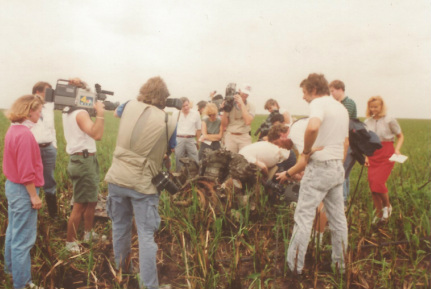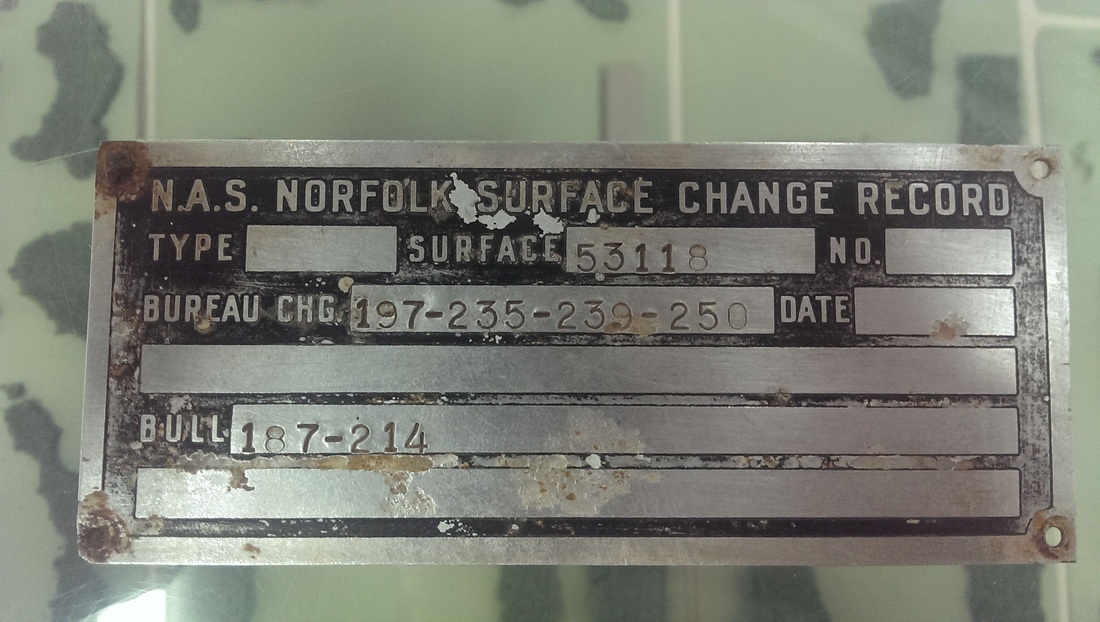
By Ken Kaye, Staff writer 11:05 a.m. EDT, April 18, 2014
The mystery of Flight 19 remains unsolved. Yet, as a result of the quest to unravel that riddle, another bewildering aviation case has just been cracked.
New evidence led two aviation sleuths to believe that a TBM Avenger found in the Everglades 25 years ago might have been flown by the commander of the "Lost Patrol," the five Navy torpedo bombers that vanished after takeoff from Fort Lauderdale in 1945.
But a photo of the Avenger's bureau number instead proves the plane was flown by Ens. Ralph N. Wachob, 26, of Fort Lauderdale, a Naval Reserve officer who developed vertigo during a navigational exercise. He crashed in far western Broward County and was killed on March 16, 1947 – 15 months after Flight 19 disappeared and popularized the myth of the Bermuda Triangle.
"We have positively identified the unknown Everglades Avenger, thus solving a decades-old mystery," said Andy Marocco, a California businessman and a Flight 19 aficionado, who pieced together the puzzle. "It just wasn't the Avenger we were hoping for."
Aviation experts estimate that between 50 and 100 military and civilian aircraft have crashed in the Everglades over the past several decades and have yet to be found – or positively identified. An air boat group that occasionally finds wrecks says some of the planes are noted on maps as hazards to navigation.
Marocco and fellow Lost Patrol enthusiast, Jon Myhre, a former Palm Beach International Airport controller, initially were convinced Wachob's plane was the TBM-3 Avenger flown by Lt. Charles Taylor, the Flight 19 leader.
They based their theory on the Navy's official Flight 19 accident report that said the planes might have turned southeast after being spotted over North Florida. After the Sun Sentinel ran a story about their theory, Minerva Bloom of the Naval Air Station Fort Lauderdale Museum sent Marocco several photos of the 1989 wreckage of the TBM-3 Avenger.
Marocco found the bureau number of the Everglades plane, 53118, from one of the photos and ran it through Navy aircraft history and accident databases. It verified that Wachob, not Taylor, was the single occupant of the plane.
"That is amazing, that we now have a name and can put that particular wreck to rest," Bloom said.
Experts saw the same number in 1989, but it was mislabeled, Marocco said.
Wachob, the pilot of the doomed plane, encountered heavy rain while on a training flight from Miami toTampa with two other planes. He lost sight of the flight leader, got disoriented and crashed. The other two planes returned to Miami, Marocco said.
Navy officials recovered Wachob's body and investigated the accident. In May, 1989 – 42 years later – the wreckage of his plane was spotted by a Broward Sheriff's helicopter pilot.
"Based upon accident records, it seems that the identity of the Avenger was known to the Navy at one time," Marocco said. "It was just forgotten about for many decades."
Hoping for clues in the Lost Patrol case, Marocco and Myhre asked the Broward Airboat, Halftrack and Conservation Club of Davie to hunt for the wreckage of the Avenger. While searching, the group last week stumbled on another vintage warplane.
"We just happened to see the landing gear sticking up out of the sawgrass," said Brett Holcombe, the club's president. "We also found the tail section and two wings. But the motor, we couldn't find."
Rick "Boog" Mears, a club member, initially discovered the plane in far western Broward near the Palm Beach County line. Based on photos by the air boaters, Marocco identified the plane as a Douglas A-1 Skyraider, a single-engine attack plane.
He still is trying to identify its specific mission and pilot.
The air boaters didn't remove any of the wreckage because the Navy plans to look into the matter.
"It's considered a sunken or terrestrial military aircraft, so we're definitely going to be interested in knowing about it," said Paul Taylor, spokesman for the Naval History and Heritage Command in Washington, D.C.
Marocco, head of Aeroquest.org, a volunteer aviation organization, said the group now plans to "investigate other historical WWII aircraft wrecks that may be in the Everglades or elsewhere in Florida."
Meanwhile, he's not abandoning his theory that some of the Flight 19 planes might have crashed in the Everglades.
"There's still plenty of land in the Everglades, where a small plane like an Avenger could have crashed and still waiting for us to discover," he said.
kkaye@tribune.com or 561-243-6530.
The mystery of Flight 19 remains unsolved. Yet, as a result of the quest to unravel that riddle, another bewildering aviation case has just been cracked.
New evidence led two aviation sleuths to believe that a TBM Avenger found in the Everglades 25 years ago might have been flown by the commander of the "Lost Patrol," the five Navy torpedo bombers that vanished after takeoff from Fort Lauderdale in 1945.
But a photo of the Avenger's bureau number instead proves the plane was flown by Ens. Ralph N. Wachob, 26, of Fort Lauderdale, a Naval Reserve officer who developed vertigo during a navigational exercise. He crashed in far western Broward County and was killed on March 16, 1947 – 15 months after Flight 19 disappeared and popularized the myth of the Bermuda Triangle.
"We have positively identified the unknown Everglades Avenger, thus solving a decades-old mystery," said Andy Marocco, a California businessman and a Flight 19 aficionado, who pieced together the puzzle. "It just wasn't the Avenger we were hoping for."
Aviation experts estimate that between 50 and 100 military and civilian aircraft have crashed in the Everglades over the past several decades and have yet to be found – or positively identified. An air boat group that occasionally finds wrecks says some of the planes are noted on maps as hazards to navigation.
Marocco and fellow Lost Patrol enthusiast, Jon Myhre, a former Palm Beach International Airport controller, initially were convinced Wachob's plane was the TBM-3 Avenger flown by Lt. Charles Taylor, the Flight 19 leader.
They based their theory on the Navy's official Flight 19 accident report that said the planes might have turned southeast after being spotted over North Florida. After the Sun Sentinel ran a story about their theory, Minerva Bloom of the Naval Air Station Fort Lauderdale Museum sent Marocco several photos of the 1989 wreckage of the TBM-3 Avenger.
Marocco found the bureau number of the Everglades plane, 53118, from one of the photos and ran it through Navy aircraft history and accident databases. It verified that Wachob, not Taylor, was the single occupant of the plane.
"That is amazing, that we now have a name and can put that particular wreck to rest," Bloom said.
Experts saw the same number in 1989, but it was mislabeled, Marocco said.
Wachob, the pilot of the doomed plane, encountered heavy rain while on a training flight from Miami toTampa with two other planes. He lost sight of the flight leader, got disoriented and crashed. The other two planes returned to Miami, Marocco said.
Navy officials recovered Wachob's body and investigated the accident. In May, 1989 – 42 years later – the wreckage of his plane was spotted by a Broward Sheriff's helicopter pilot.
"Based upon accident records, it seems that the identity of the Avenger was known to the Navy at one time," Marocco said. "It was just forgotten about for many decades."
Hoping for clues in the Lost Patrol case, Marocco and Myhre asked the Broward Airboat, Halftrack and Conservation Club of Davie to hunt for the wreckage of the Avenger. While searching, the group last week stumbled on another vintage warplane.
"We just happened to see the landing gear sticking up out of the sawgrass," said Brett Holcombe, the club's president. "We also found the tail section and two wings. But the motor, we couldn't find."
Rick "Boog" Mears, a club member, initially discovered the plane in far western Broward near the Palm Beach County line. Based on photos by the air boaters, Marocco identified the plane as a Douglas A-1 Skyraider, a single-engine attack plane.
He still is trying to identify its specific mission and pilot.
The air boaters didn't remove any of the wreckage because the Navy plans to look into the matter.
"It's considered a sunken or terrestrial military aircraft, so we're definitely going to be interested in knowing about it," said Paul Taylor, spokesman for the Naval History and Heritage Command in Washington, D.C.
Marocco, head of Aeroquest.org, a volunteer aviation organization, said the group now plans to "investigate other historical WWII aircraft wrecks that may be in the Everglades or elsewhere in Florida."
Meanwhile, he's not abandoning his theory that some of the Flight 19 planes might have crashed in the Everglades.
"There's still plenty of land in the Everglades, where a small plane like an Avenger could have crashed and still waiting for us to discover," he said.
kkaye@tribune.com or 561-243-6530.


 RSS Feed
RSS Feed